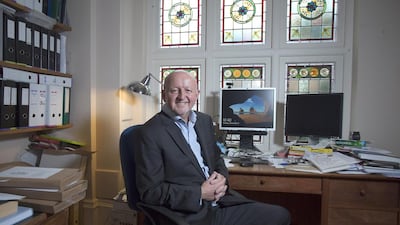Authenticity and honesty are the keys to a leader creating a workplace of dreams, according to two London Business School professors.
Gareth Jones and Rob Goffee are the authors of the Why Should Anyone Work Here?, published last month, the follow-up to their hugely successful 2006 management book Why Should Anyone Be Led By You?
In their latest work, the authors identify six traits to create the workplace of dreams: Difference – let people be themselves; Radical honesty – communicate what’s really going on; Extra value – magnify people’s strengths to encourage high performance; Authenticity – encourage staff to be real and bring out the best in themselves; Meaning – create satisfying work that they see contributing to the organisation; and Simple rules – have clear company rules that make sense. Taken together, they form the acronym Dreams.
The British authors say this framework is especially important in the Middle East, where workforces are made up of culturally diverse staff. Jones, a fellow of executive education at London Business School and visiting professor at IE Business School, expands on the six basics.
Gareth, you advise businesses to be authentic, but how can they be, with so much pressure from markets and shareholders?
If you look at companies such as Deutsche Post, which went through weeks of strikes this summer over working hours, or Northern Rock – the first bank in the United Kingdom to face a run on it in 150 years after asking the Bank of England for a loan during the run-up to the 2008 financial crisis), you will see that businesses can’t afford to be inauthentic. If corporations are not authentic, we fall out of love with them.
Radical honesty – surely that’s tough to achieve without giving away your game plan?
Begin with the hypothesis that you should tell the truth, because in a world of social media, the truth will out. You do have to be pragmatic. There are things companies should not share if they compromise intellectual property or give an advantage to competitors. The Danish pharmaceutical brand Novo Nordisk tries to be transparent and responsible – and its leader, Lars Sørensen, has just been named the best-performing chief executive of the year by the Harvard Business Review.
If companies embrace strength, should they dispense with developmental areas in reviews?
Ultimately, make the best better and your weakest better. Not all weaknesses are equal – it’s a fatal flaw for a financial director to not be able to balance a sheet. But some are remedial. I’m taking tennis lessons, for instance. My ambition is to become 20 per cent better at tennis, not 100 per cent.
What are your top tips for Middle East businesses to keep the rules simple?
This is the hardest challenge for all Dreams organisations worldwide. We live in a globalised world and all firms – particularly big companies – are now judged by globalised standards. When you make a mistake, you must resist the temptation to create a new rule. For existing rules, do the people who have to enforce them understand them? Bureaucracy is bad when people ask “why?” and are told “because that’s what the rule says”.
What about the role of Human Resources?
I’m a former HR director myself, twice over – at PolyGram and the BBC. HR is often known as the Department of Rules, of what you can’t do. HR must recruit well. Building human capital and adding value, to make staff more employable, makes organisations likely to succeed in the future. McDonald’s recruits largely unskilled, young staff and makes a phenomenal investment over 12 to 18 months in their numeracy, literacy and team-building. Sensible banks are realising we are not going back to the world before 2008, and there are new players such as PayPal, so they have to be in the business of renewing and developing skills. This is not a “nice to have” issue, it’s a business imperative.
How do Middle East companies make diversity an advantage?
Creativity increases with diversity and declines with sameness. The diversity agenda is not restricted to science and media, either – it’s across the board, including utilities, oil and transport. The world is changing so fast that if you don’t innovate, you’re dead.
What can a business leader do tomorrow to be better?
First, be consistent with both words and deeds – don’t let a gap open between what you say and do. Second, ensure you bring the “essential you” to all your roles. I’m a husband, a father, a tennis player, an author, a consultant, a professor. I hope people say they recognise Gareth in all those roles. Finally, be comfortable with your origins – what made you who you are. That’s the dictionary definition of authenticity: “of undisputed origins”. You can change the future but you can’t change the past.
business@thenational.ae
Follow The National's Business section on Twitter

